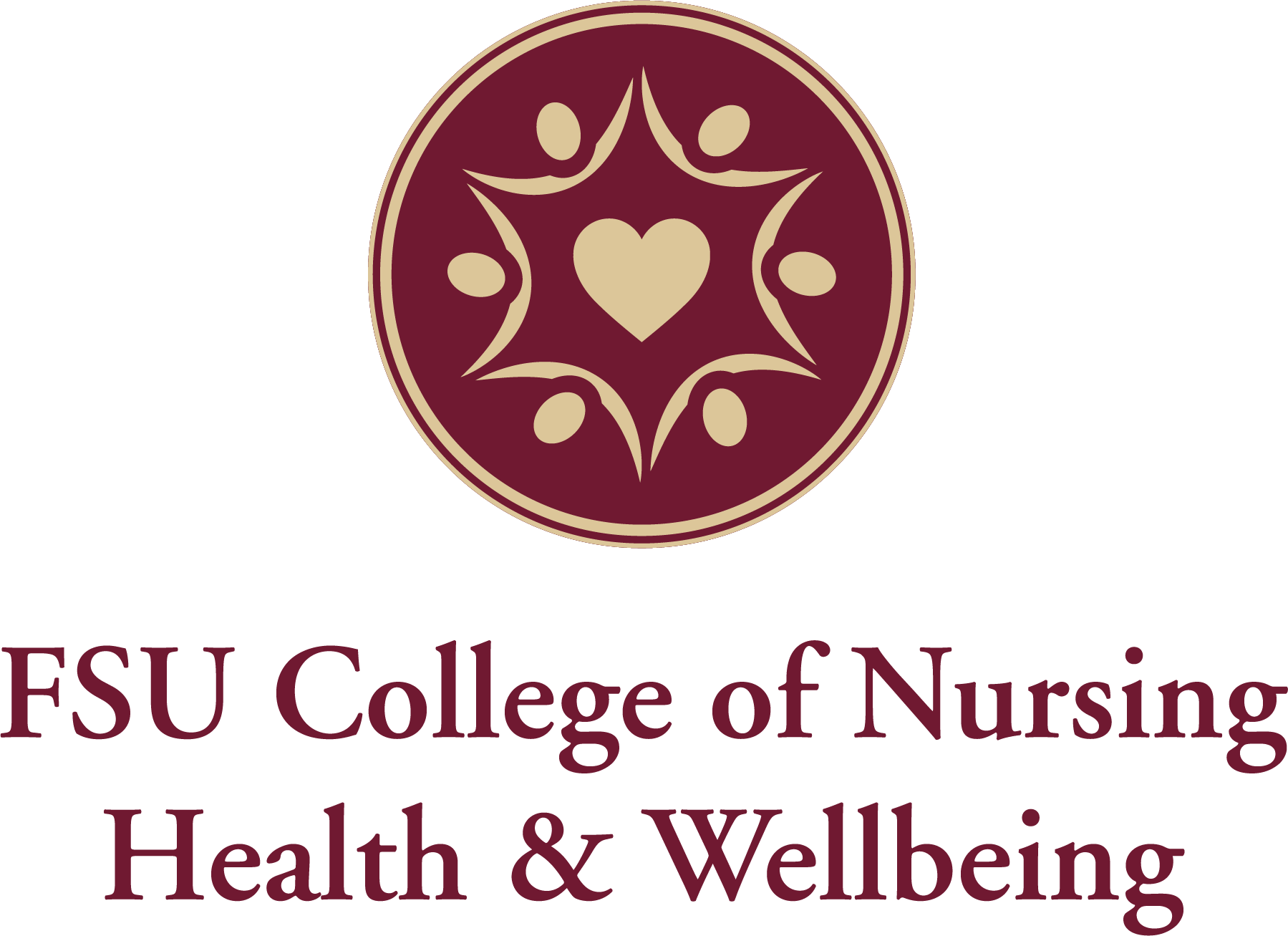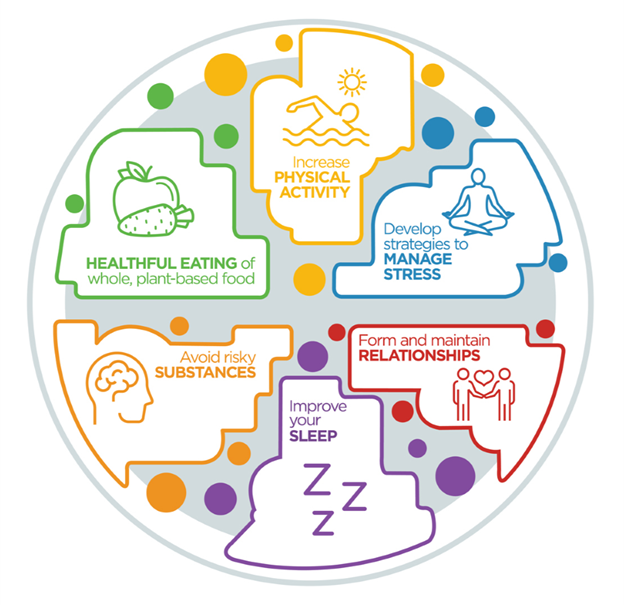We believe the health and wellbeing of nurses are paramount, and we're here to help you prioritize YOUR health and wellbeing. Whether you're a student, faculty or staff in the College of Nursing, explore a wealth of activities, resources and a supportive community right here.
About the Committee
In 2023, Dean Wang brought together an ad hoc Health & Wellbeing Committee, under the leadership of April Lovett, to formulate a comprehensive strategy to enhance the health and wellbeing of the college's students, faculty, and staff. The Health & Wellbeing Committee's charge aligns with the College of Nursing's 2023-2028 Strategic Plan objectives to create an academic environment focused on prioritizing the health and wellbeing of our students, faculty, and staff (Objective 5 under IV. Organizational Wellbeing, Excellence, and Reputation).
In January 2024, the Marketing & Communication sub-committee, led by Nhung Van, created the Health & Wellbeing Committee's logo (below). The heart represents a heart of care demonstrated by nurses. The six seeds of health surrounding the heart represent the six pillars for advancing a healthy lifestyle (see more in the "Our Guiding Frameworks" section below about the ACLM's Six Pillars of Health).

Our Guiding Frameworks
The Health & Wellbeing Committee uses three primary frameworks as the cornerstones of our work.
1. The American College of Lifestyle Medicine (ACLM) has identified six fundamental pillars that serve as pivotal areas of emphasis for the advancement and implementation of lifestyle medicine within the realm of healthcare. FSU's Doctor of Nursing Practice (DNP) program in Lifestyle Medicine equips nurse practitioners with the proficiency to adeptly apply these six pillars in clinical practice. Our aim is to seamlessly connect the curriculum's foundational framework with real-world application by ensuring the integration of these pillars into our strategic direction and its corresponding activities. These six pillars include:

-
Healthy Eating: This pillar emphasizes the importance of a whole-food, plant-based diet as a foundation for health. It involves encouraging the consumption of fruits, vegetables, whole grains, legumes, and minimizing processed and animal-based foods. Organizations can incorporate nutrition by offering dietary education, promoting healthy food choices, and providing access to nutritious options in cafeterias and vending machines.
-
Physical Activity: Regular physical activity is crucial for overall health and well-being. Organizations can promote exercise by offering fitness programs, encouraging employees to engage in physical activity, and creating supportive environments for active living.
-
Stress Management: Chronic stress can have a negative impact on health. Organizations can provide stress reduction programs, mindfulness training, and mental health support services to help individuals manage stress and improve their emotional well-being.
-
Sleep: Adequate and quality sleep is essential for optimal health. Healthcare organizations can educate individuals about the importance of sleep hygiene, offer resources for improving sleep, and promote a culture of prioritizing rest.
-
Substance Use: This pillar addresses the harmful effects of tobacco, alcohol, and substance abuse. Organizations can implement policies and programs to support smoking cessation, alcohol moderation, and substance abuse treatment. They can also provide resources for individuals looking to quit or reduce harmful behaviors.
-
Social Connections: Social relationships and a sense of community are essential for well-being. Healthcare organizations can create opportunities for social engagement, such as group activities, support groups, and community events, to help individuals build and maintain healthy relationships.
2. The American Nurses Association’s (ANA) Health Nurse, Healthy Nation initiative was launched on May 1, 2017, to connect and engage participants and organizations in six domains meant to positively address nurse health nationwide: physical activity, rest, nutrition, quality of life, safety, and mental health. Participants take a health assessment survey and receive a heat map of their health risks, then pick a focus area to make their health commitment and participate in related challenges. Participants can connect with others for support and advice through the HNHN platform.
3. Finally, the Health and Wellbeing Committee is dedicated to embedding the Building Healthier Academic Communities framework into the core of our vision, mission, and goals. Through a holistic approach that encompasses evidence-based practices, collaborative initiatives, and a commitment to continuous improvement, we aim to create a paradigm shift in the landscape of health and well-being within our academic community and beyond. This resource provides additional information for addressing health and wellness in the health sciences majors.
Strategic Direction
- FSU as a Role Model. We strive to become a role model on-campus, in the community, and nationally as an example of an organization that supports our students, faculty, and staff in all of their roles, including that of nurse practitioner.
- Support through Resources. We will provide resources that empower, uplift, and support our students, faculty, and staff on their health and wellbeing journeys.
- Communicate and Inform. We will use digital and traditional communication to reach our students, faculty, and staff to provide information that empowers them to engage in health and wellbeing activities.
- Provide Activities and Events. We will identify or facilitate engaging activities and events that support individual health and wellbeing while engaging our students, faculty, and staff in community with one another.
- Engage with Partners. We will engage with collaborative partners on campus, in the community, and nationally to provide opportunities for health & wellbeing for our own students, faculty, and staff and the larger community.
Committee Representatives
| April Lovett (Chair) | Director, Assessment & Evaluation (Staff) |
| Anna Stine | Student Resource Specialist (Staff) |
| Lynn Sleeth | Director of Student Success (Staff) |
| Mia Kay Newlin-Bradner | Teaching Faculty (Faculty) |
| Ali Craig-Rodriguez | Clinical Professor (Faculty) |
| Nina Davis | Senior Undergraduate Academic Program Specialist (Staff) |
Contact Us: Have ideas or suggestions? Want to partner with us? Contact the Chair, April Lovett.
